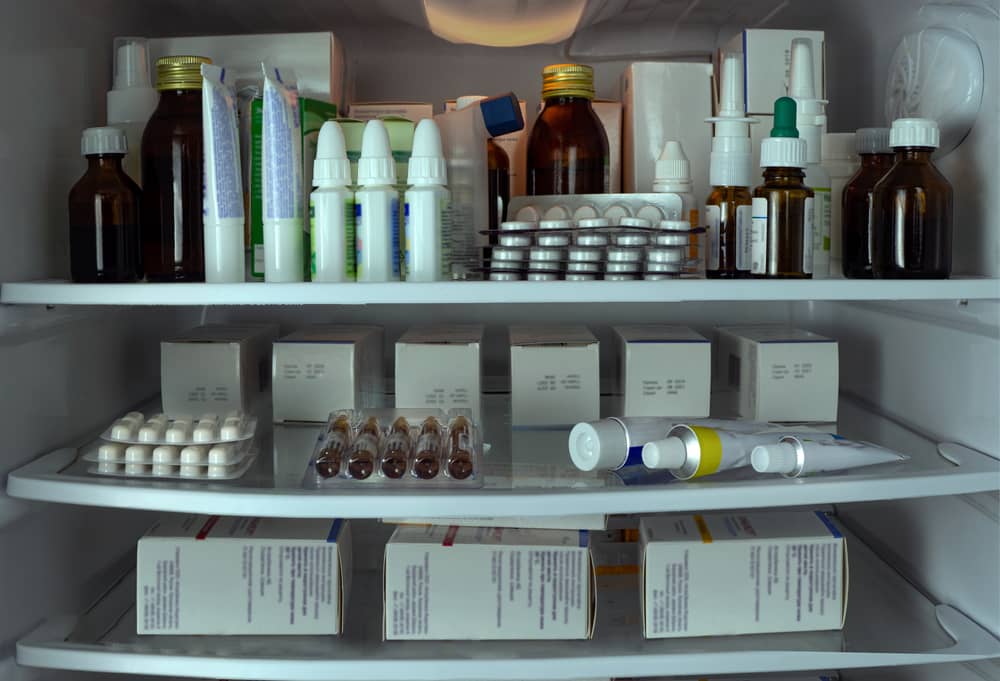When looking for probiotics online, you’ve probably come across two options: refrigerated probiotics and shelf-stable ones. Is one superior to the other? Should you choose refrigerated probiotics? Why do they need to be refrigerated? We’ll explore these questions in this article.
Key Takeaways
- Probiotics are supplements of healthy bacteria that will improve your gut health.
- Whether a probiotic needs to be refrigerated or not will likely depend on the types of bacterial strains that it contains.
- The potency of refrigerated probiotics is not more than non-refrigerated options.
If you’re looking for the best probiotics online, you’ve likely come across two different options: refrigerated and shelf-stable. One of them is found in the refrigerated section of health food stores while the other will be sitting in the aisles.
Some people are under the misconception that all probiotics need to be refrigerated. Or, they’re under the misconception that refrigerated probiotics are “fresher”. They also believe that these probiotic supplements are more effective at maintaining a healthy gut. They think that these probiotics will be able to treat, cure or prevent more ailments.
But, are these beliefs true? We’ll tackle them in this article.
Do Probiotics Need to Be Refrigerated?
The answer to that is it depends.
Some probiotics need to be refrigerated and others don’t. The only way that you’ll find out is if you check the label. If the probiotic needs to be refrigerated, the manufacturer will have that somewhere on the packaging.
You can also generally tell whether the probiotics need to be refrigerated or whether it can be stored at room temperature based on where it was stored at the store. If you found your probiotics in a box in an aisle, then they typically don’t require refrigeration.
On the other hand, if you found your probiotics in a refrigerator in a health supplement store, then you should probably refrigerate it as soon as possible when you get home. This keeps the probiotics as stable as possible.
The reason why some probiotics need to be refrigerated and others don’t is due to the type of good bacteria it contains. If the probiotics contain live bacteria, they’ll usually require refrigeration.
Are Refrigerated Probiotics Better?
 Some people equate refrigeration with freshness. However, as benefit and efficiency goes, you’ll get around the same types of benefits with refrigerated probiotics as you would with shelf-stable options.
Some people equate refrigeration with freshness. However, as benefit and efficiency goes, you’ll get around the same types of benefits with refrigerated probiotics as you would with shelf-stable options.
It really mostly depends on what types of probiotic strains you’re looking for, and whether those bacteria can be freeze-dried or not. If they can be freeze-fried, they will often be shelf-stable and can be purchased non-refrigerated.
For example, some spore-forming bacteria, like Bacillus or Clostridium, do very well freeze-dried, so they do not need to be refrigerated. These probiotic supplements can still interact with the intestine and digestive tract directly to prevent diarrhea, yeast infections and other gastrointestinal problems.
So, if you’re looking for something to diagnose, treat, cure or prevent diarrhea while you’re on a trip, these are the types of probiotic supplements that you should look for.
On the other hand, other types of probiotic bacteria, like Lactobacillus delbrueckii, are really sensitive to processing. This type of probiotic bacteria is great for treating colic, hay fever, eczema, liver disease, inflammatory bowel disease and the common cold.
So, whether or not a refrigerated probiotic would be more beneficial to you will depend on what you intended to diagnose, treat or cure. Both types of probiotics offer the same level of probiotic benefits and can do wonders for your gut health.
What Happens If I Leave Refrigerated Probiotics Out?
If you found a probiotic supplement in the refrigerator and the packaging tells you explicitly to refrigerate the live bacteria the moment that you get home, you should avoid having it in the sun or leaving it out.
Heat and moisture from the humidity can kill some, if not all, of the healthy bacteria in these probiotics. This will significantly shorten their shelf life. By keeping refrigerated probiotics out in the open, the live cultures will become less stable and efficient. They need to be kept cold at all times.
Refrigerated vs. Non-Refrigerated Probiotics
So, which one should you choose? Which one would be better for your needs?
Well, it depends. We highly recommend that you familiarize yourself with the benefits that are offered by different strains.
Personally, we recommend going with non-refrigerated probiotics because they tend to be more convenient and less fragile. If you’re someone who likes to travel or take your probiotics during lunch, you probably don’t have access to a fridge at all times. You won’t have to worry about the stability of the probiotics if you go with a non-refrigerated option.
How to Store Probiotics that Do Not Need to Be Refrigerated
Although shelf-stable probiotics are more convenient, they still need to be properly stored. You still need to do your due diligence to ensure that you keep the healthy bacteria in as great of a condition as possible. The way that you store your probiotics can have a profound impact on the efficacy of the product. We suggest that you do the following:
- Make sure that the bottle is sealed tightly. You do not want to expose the probiotics to air. This can “dry” the probiotics out or affect them in a negative manner. Make sure that you screw the lid on tightly after you’ve taken out a supplement.
- Keep the supplements in their original packaging. Have you noticed that some probiotics are stored in blacked-out glass containers? There’s a reason for that. Some materials are better at reducing humidity and protecting the bacteria that are in the probiotics.
- Store it in a cool, dry place. Even if your probiotics do not need to be refrigerated, do not keep them out on the countertop where they will be exposed to the sun. Instead, store them in a cool, dry place to preserve their overall efficacy.
- Avoid storing them in a bathroom cabinet where you shower. If you like hot showers and bath, keep your probiotics away from that bathroom cabinet, as it will be exposed to more heat and humidity.
At the end of the day, you should keep your probiotics away from two specific elements: heat and humidity. These two elements can rapidly degrade the efficacy of the product.
Keep in mind the expiration date. Refrigerated probiotics will usually have a clear expiration date on the packaging. Non-refrigerated ones should be kept for a maximum of two years.
The Bottom Line
If you’re looking for probiotics, refrigerated probiotics aren’t necessarily superior to or better than shelf-stable options. Choose a probiotic that works for you. Look for one that has a lot of varieties when it comes to bacterial strains and at least 10 billion CFUs if the probiotics are for adults.
If the probiotics are for children, you can get away with nutritional supplements that contain only 5 billion CFUs. This promotes optimal gut health. It also allows your children to fully enjoy all of the probiotic benefits that come with taking these supplements.
If you have any further questions, ask your healthcare professional for more clarification! Choosing the right probiotic is a step toward a healthier gut and body.






